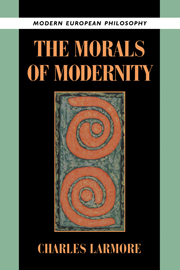2 - Beyond Religion and Enlightenment
Published online by Cambridge University Press: 18 December 2009
Summary
The Modern World and Religion
God is so great he does not have to exist. Thus might we describe the essence of the process of secularization that has so profoundly shaped modern society. The repudiation of idols, the respect for God's transcendence, is what has led to relieving God from the task of being the ultimate explanation for the order of nature and the course of history. To explain something in terms of divine action or Providence always amounts to placing God among the finite causes we have already found or can imagine discovering. Once we have resolved to let God be God, we can no longer use God for our own cognitive ends. A similar unburdening of God seems appropriate in the domain of morality. When the validity of a moral demand is understood in terms of being God's command, the motive of the moral life becomes the desire to please God, as though we could help him or should fear him. Such a conception of God must appear as an all-too-human projection, if we assume that God must transcend such human needs and passions. We respect God as God when we learn to value the moral life for itself without appeal to God's purposes (though we may still believe that God loves what is good and right).
This view of the modern process of secularization has two important implications.
- Type
- Chapter
- Information
- The Morals of Modernity , pp. 41 - 64Publisher: Cambridge University PressPrint publication year: 1996

